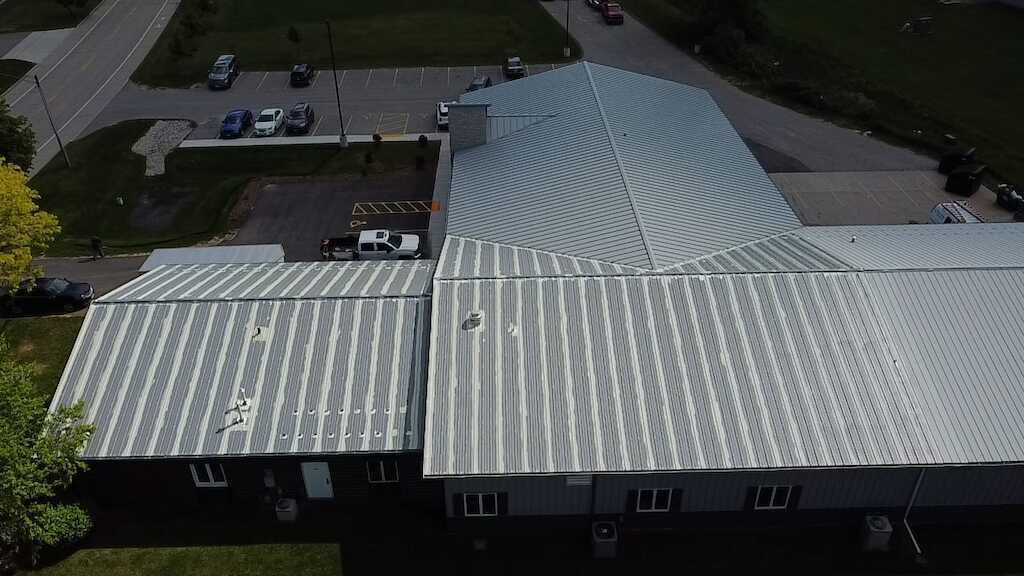You’re looking to install a new roof. You’re considering going with metal, in particular. However, before you choose a metal roof, you want to know: how long does a metal roof last?
That’s dependent on a variety of factors. We’re not only going to provide you with these factors but we’re also going to discuss a typical lifespan for a metal roof. Let’s discuss everything there is to know about the metal roof lifespan.
How Long Does a Metal Roof Last?
While there are a number of factors that will determine a particular metal roof’s lifespan, it’s safe to say that most metal roofs last somewhere between 40 and 70 years. In fact, many metal roofing materials come with warranties of 50 years or greater.
Compared to other roofing materials, metal roofing is in the middle of the durability totem pole. Whereas asphalt shingles last for 30 years, and cedar shakes last for 40 years, slate tiles and clay tiles last for over 100 years.
Factors That Affect Metal Roof Lifespan
As was noted, there are a number of factors that can affect the lifespan of a metal roof. Some of the most prominent of these factors include the following:
Weather Conditions
One of the most influential factors when it comes to the lifespan of a metal roof is weather conditions. The milder the weather conditions, the less wear and tear the roof will take on. The less wear and tear the roof takes on, the longer it will thrive.
Precipitation, in particular, can have a seismic effect on metal roof lifespan. This is because regular water exposure can result in premature rusting.
Make note, though, that heavy winds can result in increased deterioration as well. So too can the weight of accumulated snow.
Maintenance
Not only do weather conditions affect the lifespan of metal roofing but so too does maintenance. The better job you do of maintaining your roof, the longer it will last. If you don’t do any maintenance work at all, your roof will die long before its time.
Now, what does maintenance look like for a metal roof? Primarily, it involves regular cleaning. Not only should you wash the roof thoroughly every 6 months or so but you should also ensure that debris is cleared from the roof as much as possible.
See, debris like leaves and trash can trap water against the roof. If water is trapped against the roof, it will rust prematurely. Therefore, to keep rusting to a minimum, you must remove debris from the roof as soon as possible.
In addition to this, you must also ensure that the fasteners on each metal panel are still tight. If panels become too loose, they could allow water to become trapped under them. This could result in premature rusting.
This is why you’re advised to have your metal roof professionally maintained annually. Have a professional roofing company inspect it and make all necessary tune-ups. Doing so will add years to your roof’s life.
Installation Quality
Installation quality can have a large effect on a metal roof’s lifespan as well. If your roof is installed in an improper manner, it could become more susceptible to water damage. This would result in premature deterioration.
As such, when installing a metal roof, it’s vital to utilize the services of a seasoned roofer. Only a pro roofer understands the many steps that go into proper roof installation.
Roof Pitch
The pitch of a roof is its slope. It refers to how much of an angle the roof has. The less pitch a roof has, the more it will hold water, and the more wear and tear it will take on over time.
Therefore, it stands to reason that a metal roof with a lesser slope would die out sooner than a metal roof with a greater slope. Its reduced ability to shed rain and snow will result in more prolonged water exposure. This will result in premature rusting.
Attic Ventilation
Another factor that can affect the lifespan of a metal roof is attic ventilation. If the attic isn’t adequately ventilated, the metal roofing material will die out sooner than it would otherwise. This is because, when a roof doesn’t possess adequate ventilation, condensation tends to build up within it.
Condensation, of course, exposes the metal roofing material to water. When the metal is constantly exposed to water, it’s going to rust prematurely.
A lack of attic ventilation can also result in increased heat. This heat could place undue stress on the metal roof, causing it to lose strength over time.
Attic Insulation
Not only is attic ventilation important but attic insulation as well. This is because insulation prevents the attic from becoming too hot or humid.
When the attic is too hot and humid, it creates a warm and damp environment underneath the metal roofing. This invites algae, the likes of which can cause water damage to the roof over time.
Therefore, it’s imperative to adequately insulate your attic. Doing so will not only protect your roof but will also improve the energy efficiency of your home as a whole.
Material
Not all metal roofing materials are created equal. Not only do different brands provide different levels of quality but there are also massive differences between different types of metal as well.
For instance, a high-end brand of steel roofing is generally going to last longer than a low-end brand of steel roofing. On the other hand, steel roofing tends to last longer than aluminum roofing, regardless of brand.
The most common type of metal roofing today is standing seam metal roofing. This tends to last between 50 and 80 years. Tin roofs, on the other hand, rarely make it over 50 years.
You can learn more about metal roofing types by reading this article.
The Advantages of Metal Roofing
We’ve discussed the lifespan of metal roofing. Now, we’re going to discuss the material’s benefits. They include the following:
It Requires Very Little Maintenance
One of the biggest advantages of metal roofing is that it requires very little maintenance. It’s essentially a set-it-and-forget-it roof material. That said, you still need to perform some maintenance measures from time to time.
The most important aspect of metal roof maintenance is to clean the roof. Not only should you superficially clean it but you should also ensure that you’re ridding it of debris and algae.
The other aspect of metal roof maintenance is ensuring that panels remain securely attached over time. To do this, simply check the roof’s attachments every 3 to 5 years.
It’s Cost-effective
Metal roofing is not the cheapest roofing material around. However, it’s not the most expensive either. And when you factor in how long it lasts, and how little maintenance it requires, it’s actually one of the most cost-effective roofing materials in existence.
After all, you’re getting it for a good 50 to 80 years. Along the way, you really only need to clean it occasionally. So, in essence, once you’ve paid for its installation, you don’t need to pay anything else.
If you’re looking to save as much money as possible over time, give metal roofing some serious consideration. It could very well be the roofing material you seek.
It’s Physically Tough
Another upside to metal roofing is that it’s physically tough. Not only can it hold substantial amounts of weight but it also holds up well when subjected to physical trauma.
So, let’s say that a tree branch falls on your roof. If a metal roof is present, it likely won’t crack or dent.
This likely wouldn’t be true with, say, an asphalt roof. Asphalt shingles are far more susceptible to cracking.
What this means, of course, is that metal roofing remains to look good over time. It also means that you rarely have to repair or replace metal roofing.
It’s Non-flammable
Some roofing materials are susceptible to fire. For instance, cedar shakes can easily light aflame when contacted with sparks. Metal roofing is the opposite of this.
Metal roofing is essentially completely non-flammable. It prevents sparks from turning into flames and prevents growing fires from spreading into the home below.
If you want as safe a roof as possible, metal roofing is the way to go.
It Offers Excellent Insulation Against Heat
One of the unique things about metal roofing is its ability to reflect the rays of the sun as opposed to absorbing them. In doing this, it prevents the home below from taking on excess heat. In fact, it essentially insulates the home from them entirely.
The effect of this? Less need for artificial cooling and, therefore, lower energy costs overall. So, if you want to save money on air conditioning over time, give some serious consideration to metal roofing.
It’s Friendly to the Environment
The last benefit of metal roofing that we’re going to discuss is environmental friendliness. Metal roofing is 100% recyclable. As such, once it’s finished being used, it can be turned into a range of other metal entities.
Many other roofing materials contain synthetic polymers and therefore need to be put in dumps and landfills. In essence, in terms of environmental friendliness, they’re the exact opposite of metal roofing.
Myths About Metal Roofing
There are more than a few myths that exist about metal roofing. Some of these myths might convince you to go with another material. Therefore, to ensure that you’re fully informed, we’re going to discuss these myths below.
Myth: Metal Roofing Is Noisy
Perhaps the most common myth is that metal roofing is noisy. For instance, you might have heard that it’s loud during heavy rain.
This certainly can be the case. However, as long as the metal roofing components are installed with insulative components as well, the amount of noise made will be minimal.
Myth: Metal Roofing Is Heavy
Another myth you might hear about metal roofing is that it’s heavy. While it’s certainly not light, it’s not heavy, either. In fact, it’s substantially lighter than materials like clay or slate tiles.
So, if you’re concerned about whether your building can hold metal roofing: don’t be. Only the weakest of structures will struggle with holding metal roofing.
Myth: Metal Roofs Attract Heat
It’s a common misconception that metal roofs attract heat. After all, metal gets pretty hot when left out in the sun.
In truth, however, metal does the opposite. It reflects the rays of the sun and therefore repels heat. This makes it a great insulator, especially when it comes to the hot months.
Myth: Metal Roofs Are Susceptible to Denting
The last myth is that metal roofs are susceptible to denting. While, yes, metal roofs can dent, it’s not common. Modern metal roofs are made out of heavy-duty materials like steel, an extremely strong material that rarely ever gives way to physical trauma.
Need Metal Roof Installation in Marshfield WI?
And there it is, an answer to the question of “how long does a metal roof last?”. As you can see, metal roofs are capable of lasting up to 70 years. So, if you’re looking for a durable roof for your property, give metal roofing panels some serious consideration.
Interested in a metal roof installation in Marshfield WI? If so, we hear at Yutzy Roofing Service are the ones to see. We’ve installed metal roofs on countless commercial properties and we can do the same for yours.
Contact us today to discuss your roofing installation!

